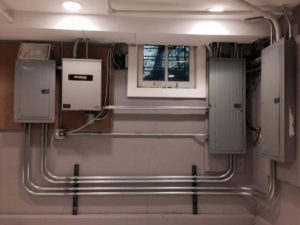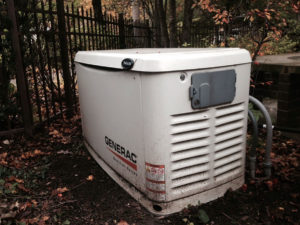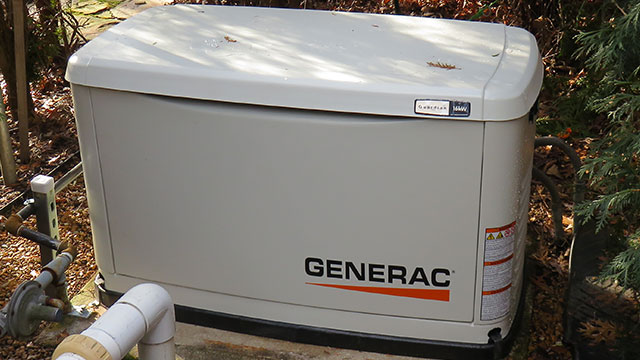During a power failure, you may no longer have heating, lighting, hot water, or even running water. If you have a cellphone, you may not have service. If you don’t have a battery-powered radio device, you may not be able to hear the news. In other words, you could be facing major problems. During the cold season, most power outages occur when a winter storm brings rain, sleet, and freezing winds that can seriously damage electrical installations, equipment, and power lines. Without heat supply and a backup generator, not only will you very quickly start feeling the cold, but your home could experience a humidity level that can damage its walls, floors, plumbing, and other essential installations. Consider a whole house generator installation that will make sure your house stays functioning in the event of a blackout.
A power outage can happen anywhere and anytime. It can last several hours or several days.
The best way to protect yourself and your family in the event of a power outage is to take these 4 easy steps:
-
Call Wiktorowski Electrical Services and we’ll perform a whole
house generator installation
that will keep you and your family members warm and safe during power outages.
- Know what to do before, during, and after a power outage. (Read below for more detailed information).
- Make an emergency plan for your family, so everyone knows what to do and where to go if you have to leave the house.
- Have an emergency kit so you and your family can be independent for at least 72 hours during a power outage.
By preparing in advance, you can greatly reduce the effects of a power outage.
Be Prepared
- It never hurts to plan ahead, which is why it’s important to prepare an emergency first aid kit and an evacuation plan. Some people think of preparing for a power outage when it’s already too late. You can reduce the consequences of an outage by taking the time to prepare for it. To do this, you and your family must support themselves for at least 72 hours. It is, therefore, necessary in particular to take the time to have an emergency plan and set up a basic emergency kit. If you’re not sure how to start planning for such an event, you can always consult your local electricians. Contact Wiktorowski Electrical Services via our contact form or call us at one of our offices and we’ll be happy to answer any questions that you may have.
 Have a professional electrical contractor in Chicago perform a whole house generator installation, which will power your house for days after a power outage. A backup generator installation is the most efficient way to protect your home’s access to electricity during a snow storm or any other natural disaster.
Have a professional electrical contractor in Chicago perform a whole house generator installation, which will power your house for days after a power outage. A backup generator installation is the most efficient way to protect your home’s access to electricity during a snow storm or any other natural disaster.
We are a licensed Generac Generator and Guardian Generator Service installer,
so if you are still unsure about investing in a generator, call us today and we’ll answer all your questions about the types and sizes of generators and the generator location requirements.
- Keep non-perishable foods and water bottles in your pantry. (Don’t forget your pet’s food as well.)
- If a family member or a person living in your household relies on a medical electrical device, like a breathing machine, power wheelchair, or communication devices enroll yourself in an emergency program of your community and build a support group of people who will help you in an emergency if necessary.
- Have an emergency heater that doesn’t run on electricity, like a fireplace or a wood stove. Maintain it systematically and make sure your fuel is stored in a secure place. If you have an oil or gas stove, have a licensed specialist install a shut-off valve.
What To Do During a Power Shutoff
- The most important thing is to check if the electrical failure hit only your home. Check all of your circuit breakers and fuses, as well as the power lines that supply your home. If they’re damaged immediately call a professional Chicago electrical company.
- Keep Warm! Wear layers of clothing, snuggle up under blankets, and hang any extra sheets on your windows to keep the heat in. Keep doors and windows tightly closed and wrap towels around them to block out any drafts. If necessary, move to the basement, as the insulation may be better at ground level.
 Don’t let your food thaw. Food can stay frozen for up to 24-36 hours if the freezer door is left closed. If it starts to thaw, put it in snow or ice outside. Always have a few ice cubes in your freezer; during an absence or an evacuation, if the cubes melt and then freeze again, you will know that the contents of the freezer have probably gone bad.
Don’t let your food thaw. Food can stay frozen for up to 24-36 hours if the freezer door is left closed. If it starts to thaw, put it in snow or ice outside. Always have a few ice cubes in your freezer; during an absence or an evacuation, if the cubes melt and then freeze again, you will know that the contents of the freezer have probably gone bad.- Beware of carbon monoxide poisoning. Fireplaces and chimneys should be inspected and cleaned regularly – preferably once a year. Don’t use any gas, charcoal or liquid fuel appliances inside. Never use a camping stove or a barbecue for heating your home. These types of appliances should be kept in an open, well-ventilated area.
- Listen to news reports with a battery-operated or hand-crank radio. If you are using a cell phone, text instead of making calls to free up phone lines. Dial 911 only in an emergency.
- Prevent further damage. Unplug any electrical devices to prevent surges when power is restored, you can leave one light on to know when the power comes back. If your home is electrically heated, turn on all your faucets and run a thin stream of water to prevent the pipes from freezing.
In Case of an Evacuation
- Turn off the main switch in your circuit breaker panel.
- Close the main water line and drain the piping: open all the taps, flush the water, open the drain tap in the basement and empty the hot water tank. If your home is gas-heated, turn off the ignition flame.
- Disconnect and empty the hoses from the washing machine.
- Add a little antifreeze to the water left in the toilet bowls, as well as in the siphons of sinks, and bathtubs.
- Remove any valuables from the basement floor.
When Power Is Restored
- If there is a flood in your basement due to a pipe burst, do not go downstairs until you’ve made sure that the power is completely off. If any appliances have been flooded, do not, under any circumstance, turn it on until a professional Chicago electrician has checked it out.
- Before turning on the main power switch, make sure all of your electrical and electronic devices are unplugged in order to prevent any damage from a power surge or dip. After turning back on the power, the entire electrical installation must “settle down” before reconnecting your appliances. The heating system must be reconnected first, then all other devices. If you notice any damages in your home appliances contact our Chicago electrical company and a qualified technician will be at your service.
- Restore the water supply. Turn off the faucets closest to the ground to allow air to escape from those farther away.
Licensed Electricians in Chicago: Generator Repair
When you need professional electrical work done at your Chicago-area home, it’s always best to call an experienced and qualified electrician at Wiktorowski Electrical Services, Inc. We service residential and commercial customers by providing them with the most reliable, honest, and quality workmanship.
Remember that a backup generator installation will help you during a snowstorm or a power outage and it’s the most cost-effective and dependable way to have power your home will have access to power during electricity outages.
Power outages are inconvenient and can cause serious damage to your electrical system.
 As one of the most experienced licensed electricians in Chicago we provide all local home and business owners emergency power services for damages caused by storms, flash floods, snowstorms, lightning, and other natural disasters. We provide a range of generator services ranging from installation, generator repair, generator maintenance, monitoring, load bank testing, generator rental, and many more. A whole house generator installation will keep your home in power when the grid goes down.
As one of the most experienced licensed electricians in Chicago we provide all local home and business owners emergency power services for damages caused by storms, flash floods, snowstorms, lightning, and other natural disasters. We provide a range of generator services ranging from installation, generator repair, generator maintenance, monitoring, load bank testing, generator rental, and many more. A whole house generator installation will keep your home in power when the grid goes down.

